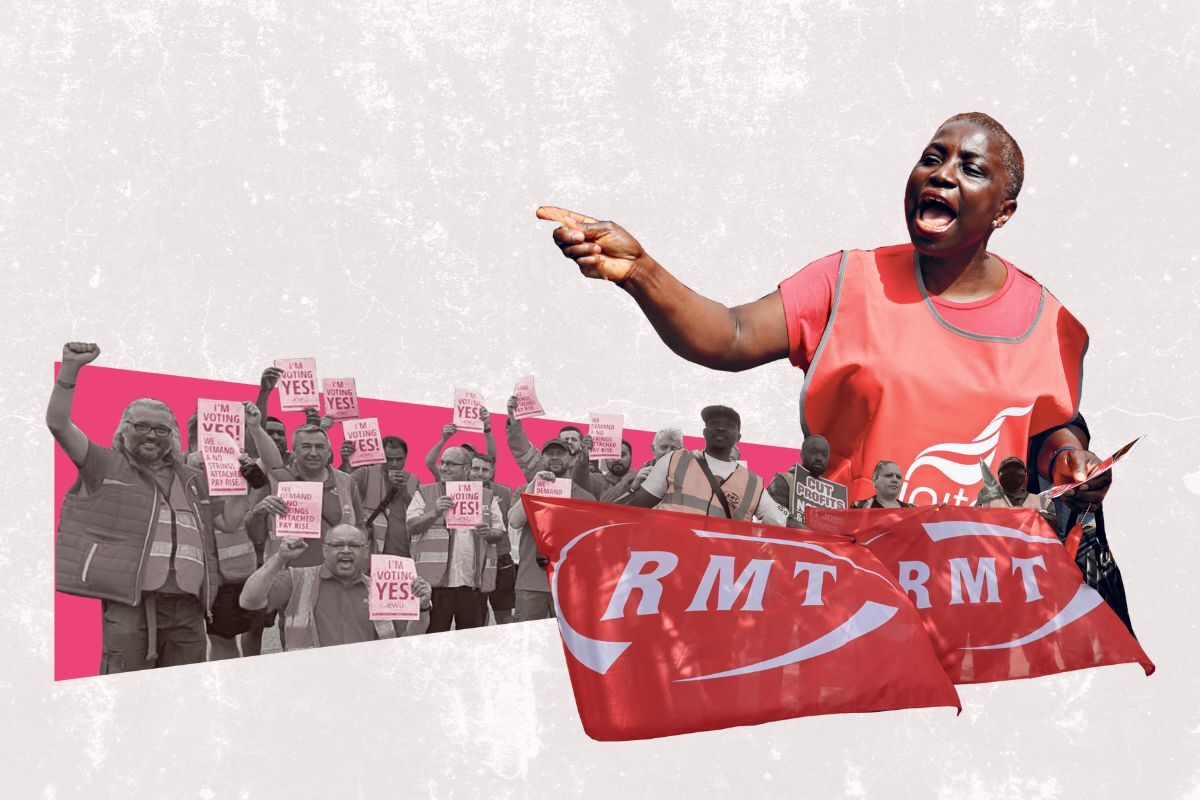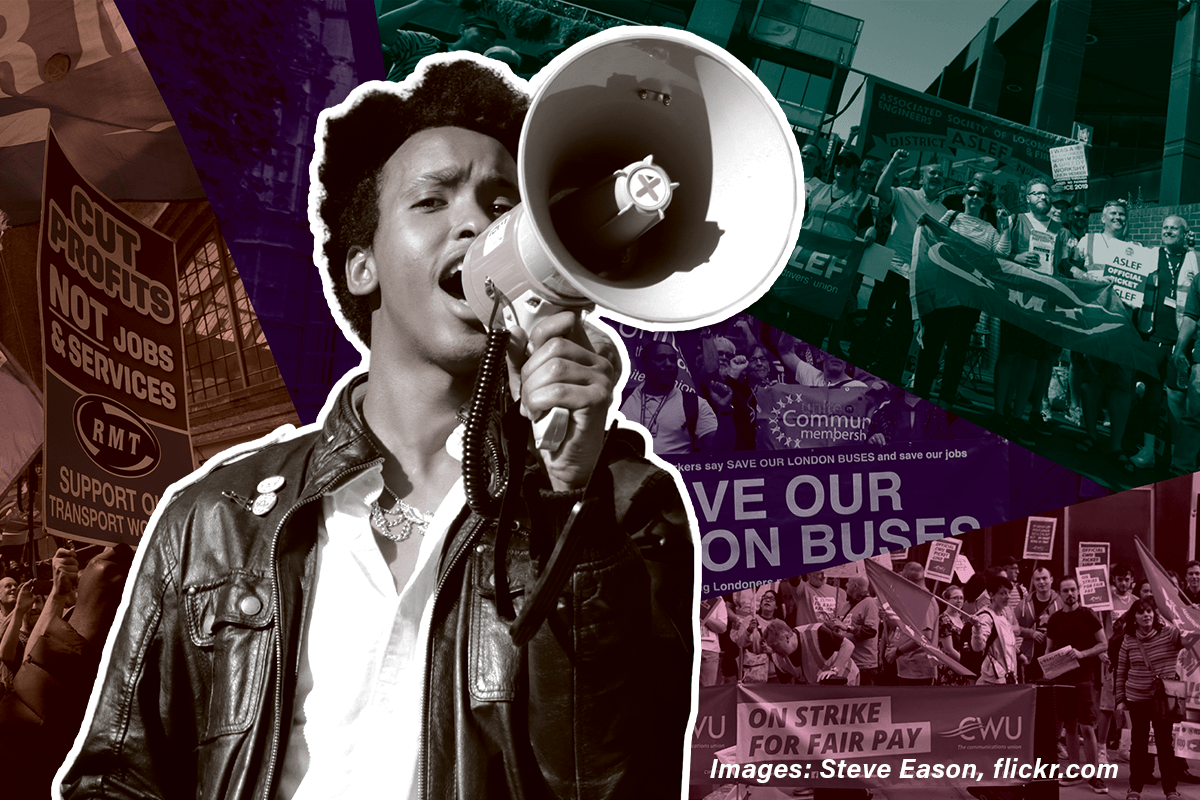Trade union delegates are meeting this week for the TUC Congress. On the agenda are motions calling for mass coordinated action. With the Tories on the ropes, and the bosses on the offensive, the time is ripe for a militant, united fightback.
In recents months, workers have begun to mobilise en masse. A rising tide of industrial militancy has spread across the country. Dockworkers, barristers, posties, call-centre workers, journalists, refuse workers, and bus drivers have all been out.
Now the bosses are striking back.
Last week, on 14 October, Royal Mail announced its intention to make up to 10,000 of its staff redundant. CEO Simon Thompson directly blamed strike action by postal workers – organised in CWU – for these cuts, claiming that repeated walkouts have pushed the company into the red.
Similarly, Peel Ports in Liverpool have also announced that 132 jobs will be slashed, despite plans to expand their operations. This follows a recent strike by dockers at Liverpool port.
Let us call a spade a spade. This is nothing less than an attempt to intimidate, bully, and scare workers into submissively accepting attacks on their jobs, pay, and conditions.
A pattern is beginning to emerge. From the brutal use of ‘fire and rehire’ tactics across industry, to the ‘jobs massacre’ at P&O Ferries: it is clear that ruthless bosses are willing to go to any length to protect their profits.
This year’s TUC Congress – now taking place in Brighton this week, from 18-20 October, postponed due to the Queen’s passing – therefore comes at a crucial time, with the class struggle becoming sharper and more bitter by the day.
A militant, united response is required. The trade union movement must fight with fire.
Instability
 CEO’s like Thompson were no doubt rubbing their hands with glee when they heard Liz Truss’ anti-union proposals earlier this year, presented by the Prime Minister during her Tory leadership campaign.
CEO’s like Thompson were no doubt rubbing their hands with glee when they heard Liz Truss’ anti-union proposals earlier this year, presented by the Prime Minister during her Tory leadership campaign.
These included plans to introduce minimum service requirements for critical industries and infrastructure; the legalisation of scabbing via agency workers; and moves to raise strike ballot thresholds from 40% to 50%. All of this was music to the bosses’ ears.
With British capitalism in chaos, however, and the Tory government paralysed by infighting and instability, the employers are having to take matters into their own hands.
Truss clearly cannot even control her own party, much less face down a wave of trade union militancy.
But with this strike movement growing and spreading, and workers gaining confidence, the bosses feel that they cannot wait for the Tories to get their act together and put the unions in their place.
Just as the working class has swung to the industrial front, with Starmer’s Labour offering no political solution for workers, it therefore seems that the capitalists too – unimpressed and impatient with their hamstrung Tory representatives – are moving into action in pursuit of their profit-making interests.
Mass resistance
 This, however, is a gamble that carries significant risks. As Marx explained, the ‘whip of counter-revolution’ can sometimes provoke a backlash, pushing workers even further and harder into struggle.
This, however, is a gamble that carries significant risks. As Marx explained, the ‘whip of counter-revolution’ can sometimes provoke a backlash, pushing workers even further and harder into struggle.
To respond to such attacks, as RMT general secretary Mick Lynch has suggested previously, a movement “rivalling the general strike of 1926, the Suffragettes, and Chartism” is required.
Now is the time to organise such a movement. When the Pentonville Five were imprisoned in the summer of 1972, the TUC threatened to call a general strike if these workers weren’t released.
Today, with capitalists attempting to use mass sackings as a weapon against the workers, a similarly militant fightback is once again needed.
The TUC has the combined industrial might of millions of workers behind it. If organised and mobilised, such a force would be unstoppable.
The union leaders must therefore step up to the tasks demanded, and realise this potential power of the working class through a mass movement of united action.
Coordinated action
 These latest explosive events come at a time when the unions are already beginning to coordinate action.
These latest explosive events come at a time when the unions are already beginning to coordinate action.
Earlier this month, on 1 October, for example, the CWU and the railway unions joined up their respective strike actions, resulting in monster turnouts on picket lines, bolstered by ‘Enough is Enough’ rallies up and down the country.
Over the weekend, meanwhile, in an interview with Sky News, Unite general secretary Sharon Graham predicted that coordinated action this winter could involve up to a million workers.
The upcoming TUC Congress could mark another important milestone, with a number of major unions putting forward motions calling for joint action, in order to fight back against the Tories’ and bosses’ attacks.
As suggested in Unison’s motion, coordinated industrial action should be part of a mass campaign of protests and strikes, linked to local rallies and demonstrations – as was seen on the first of this month, but broadened out, on an even higher level.
An immediate militant response to the bosses’ latest threats should therefore be a launchpad for coordinated, escalated, rolling strike action across the trade union movement, organised by the TUC.
And with so many public sector unions balloting in the coming weeks and months, a public sector-wide strike is inherent in the situation.
The aim of such a mass campaign must be explicit: to force the Tories out.
For socialism
 Beyond this, however, we must also ask: what are we fighting for?
Beyond this, however, we must also ask: what are we fighting for?
While it leads in the polls, Starmer’s Labour clearly offers no real solutions. His would be another government of big business, not of the working class.
Left leaders in the labour movement, meanwhile, have restricted themselves to well-meaning, much-needed, but ultimately limited demands around wages and bills.
The TUC’s campaign for £15 an hour minimum wage, for example, has left many activists rightly disappointed, with its appeal to the government to bring about this change…by 2030!
But workers are at breaking point now. The bosses, if not put in their place with a firm response, will run rampant. Capitalism cannot be patched-up. It must be overthrown.
The TUC’s ‘New Deal for Working People’ should therefore be radically updated to include bold socialist policies that tackle the root of the problem: the crisis-ridden capitalist system.
This should include demands for a sliding scale of wages, linking pay rises to inflation; repeal of all anti-trade union laws; and the nationalisation of the big banks and major monopolies, without compensation.
What is needed is a socialist planned economy, run democratically by workers, in the interests of people, not profit.
This is what the TUC must set as its aim, and must achieve by any means necessary.






